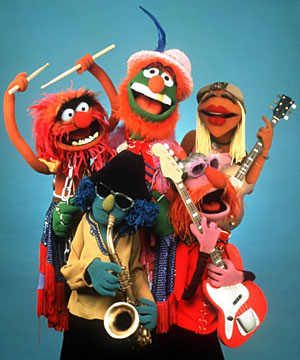
Future Fragments: Are We “Men” or Muppets?
Written by: Anastasia Salter, Pop-Culture Editor
 The Muppets are back, and they’ve aged more gracefully than many icons of their era. As Daron Taylor noted in his review of The Muppets last week on CC2K, there’s something very innocent about this film in comparison to the rest of pop culture. At the same time, there’s plenty of awareness of the expectations of modern viewers, including a particularly self-conscious addition of a band of not-Muppets who are to the “real” Muppets as bitter, drug-addicted former child stars are to their younger selves. This new film invites us to step back and find the “Muppet” in ourselves, complete with the usual song and dance alongside a story that is simultaneously modern and familiar.
The Muppets are back, and they’ve aged more gracefully than many icons of their era. As Daron Taylor noted in his review of The Muppets last week on CC2K, there’s something very innocent about this film in comparison to the rest of pop culture. At the same time, there’s plenty of awareness of the expectations of modern viewers, including a particularly self-conscious addition of a band of not-Muppets who are to the “real” Muppets as bitter, drug-addicted former child stars are to their younger selves. This new film invites us to step back and find the “Muppet” in ourselves, complete with the usual song and dance alongside a story that is simultaneously modern and familiar.
The most iconic sequences in The Muppets happen early, with a heavy dose of nostalgia for the original Muppet Show combined with a reminder of the importance of the show to an isolated Muppet in a small town. The metaphor is easy to extend—the importance of creative shows, featuring the types of people who don’t necessarily thrive in small town America, to providing young watchers with a window of hope for their own future. There’s even a bit of soul-searching over whether a love of music and performing is better than a stable career. It’s the same mindset that powers Glee, the It Gets Better campaign, and even the dreams of those watching American Idol who can imagine stepping into a winner’s shoes. Even the original melancholy song of dreamers, “Rainbow Connection,” is back in a still-wistful refrain.
Postmodern children’s entertainment seems to delve deep, with its laden intertextuality inviting adults to enjoy a laugh at the childish things they’ve supposedly put away. But The Muppets has more of the charm of a Pixar film, where the messages adults will get are not so much irony and wit as despair and nostalgia. Consider, for instance, the gradual progression towards empty nest syndrome and the need to let children go find their own path threaded throughout each Toy Story film, or the bitterness over abandoned dreams and missed opportunities at the heart of Up. (I defy you to watch that sequence without crying—I’ll readily admit I can’t.)
Few works of children’s culture survive as “new classics” anymore, while plenty get heralded with the title by overzealous marketers. A movie driven by puppetry has a better chance than most, without the 3D animation or, worse, 3D effects to tie it to a time in the evolution of computer graphics.
Even when The Muppets treads on all-too-familiar territory, or makes use of gags based on current TV shows that (however funny, as in the case of Community) will themselves be forgotten before many of the child viewers have reached their teen years, it takes a refreshing aspiration towards classic status. At the same time, The Muppets hasn’t missed the referential pop culture craze: its parody trailers alone set the tone for the campaign, as with this Girl With the Dragon Tattoo parody:
And puppetry is far from inherently innocent, as the racy (and bleakly realistic) Broadway hit Avenue Q already proved. While Sesame Street was the main target of the show, with that happy street replaced by the avenue where English majors go to find affordable rent, it was also a success in part because of the tension between the innocent facades of the puppets and its fairly serious quarterlife crisis storyline.
But in some ways, The Muppets is a reflection of the “quarterlife crisis”—a name given to the struggles over identity, finances and direction that hits particularly American youth in their 20s, often after a post-college letdown. Muppets holds its own tale of arrested development, albeit with a more optimistic bent. The story, co-written by Jason Segel, seems even more compelling with its ring of truth—Jason Segel has called working on this project a lifelong dream, and it shows. The film is a testament to authenticity over self-appreciative cleverness, while at the same time it could be read as an homage to the state of arrested development so associate with the generation (myself among them) now hitting “adulthood.”
And so perhaps the haunting photoshopped images of the Occupy protests turned Sesame Street (below) are not the only political statement the Muppets are making these days. The Occupy movement, whose political message might seem to have no place in a discussion of a film so apparently apolitical (unless you could the demonization of a rich oil man with no love for culture), is in part a reflection of the inability of some members of this generation to reach traditional adulthood, as student loans and a poor economy make jobs, houses and stability look a long ways away.

And, as The Muppets inevitably slips out of theatres to be replaced by another cynical and witty referential “kids’ flick”, perhaps some “Muppetry” will linger on in its new and old audience.
